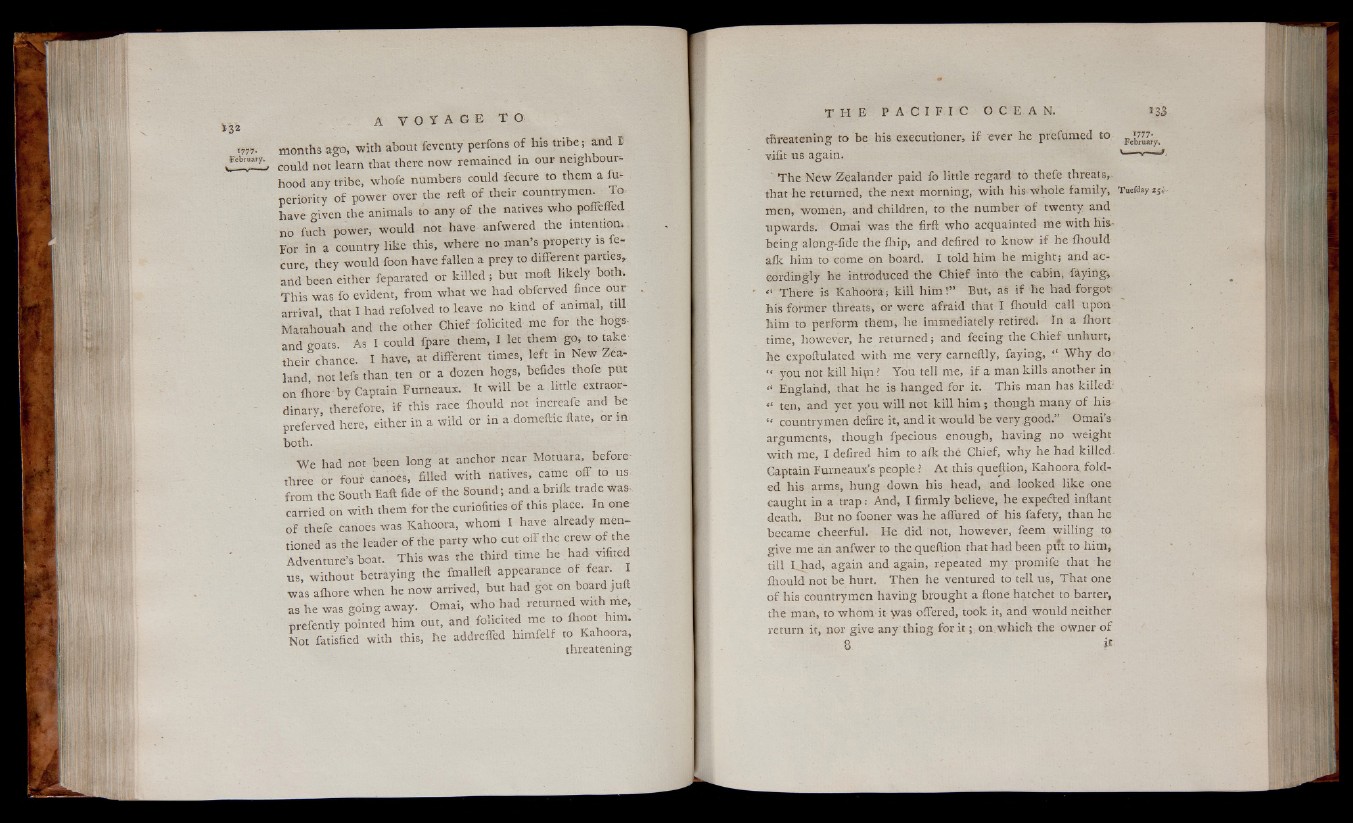
months ago, with about feventy perfons of his tribe; and 9
could not learn that there now remained in our neighbourhood
any tribe, whofe numbers could fecure to them a iu-
periority of power over the reft of their countrymen. To
have given the animals to any of the nanves who poffeffed
no fuch power, would not have anfwered the intention.
For in a country like this, where no man’s property is fecure
they would foon have fallen a prey to different parties*
and been either feparated or killed ; but moft likely both.
This was fo evident, from what we had obferved fince our
arrival that I had refolved to leave no kind of animal, till
Matahouah and the other Chief folicited me for the hogs-
and coats. As I could fpare them, I let them go, to take
their chance. I have, at different times* left in New Zealand
not lefs than ten or a dozen hogs, befides thofe put
on fhore by Captain Furneaux. It will be a little extraordinary,
therefore, if this race ihould not increafe and be
preferved here, either in a wild or in a domeftic ftate, or in
both.
We had not been long at anchor near Motuara, before
three or four canoes, filled with natives, came off to us
from the South Eaft fide of the Sound; and abriik trade was
carried on with them for the curiofities of this place. In one
of thefe canoes was Kahoora, whord I have already mentioned
as the leader of the party who cut off the crew of the
Adventure’s boat. This was the third time he had vifited
us, without betraying the fmalleft appearance of fear. T
was aihore when he now arrived, but had got on board juft
as he was going away. Omai, who had returned with me,
prefently pointed him out, and folicited me to ihoot him.
Not fatisfied with this, he addreffed himfelf to Kahoora,
threatening
threatening to be his executioner, i f ever he prefumed to
yifit us again. '— '—
The New Zealander paid fo little regard to thefe threats,
that he returned, the next morning, with his whole family, Tuefdayajj.
men, women, and children, to the number of twenty and
upwards. Omai was the firft who acquainted me with his-
being along-fide the ihip, and defired to know if he ihould
aik him to come on board. I told him he might; and accordingly
he introduced the Chief into the cabin, faying,
I There is Kahoora; kill him!” But, as if he had forgot
his former threats, or were afraid that I ihould call upon
him to perform them, lie immediately retired. In a ihort
time, however, he returned ; and feeing the Chief unhurt,
he expoftulated with me very earneftly, faying, “ Why do;
“ you not kill hipi ? You tell me, if a man kills another in
“ England, that he is hanged for it. This man has killed'
“ ten, and yet you will not kill him ; though many of his
“ countrymen defire it, and it would be very good.” Omai s
arguments, though fpecious enough, having no weight
with me, I defired him to aik thé Chief, why he had killed.
Captain Furneaux’s people ? At this queftion, Kahoora folded
his arms, hung down his head, and looked like one
caught in a trap : And, I firmly believe, he expected inftant
death. But no fooner was he affured of his fafety, than he
became cheerful. He did not, however, feem willing to
give me an anfwer to the queftion that had been put to him,
till IJiad, again and again, repeated my promife that he
ihould not be hurt. Then he ventured to tell us, That one
of his countrymen having brought a ftone hatchet to barter,
the man, to whom it was offered, took it, and would neither
return it, nor give any thing for it on.which the owner of
8 it